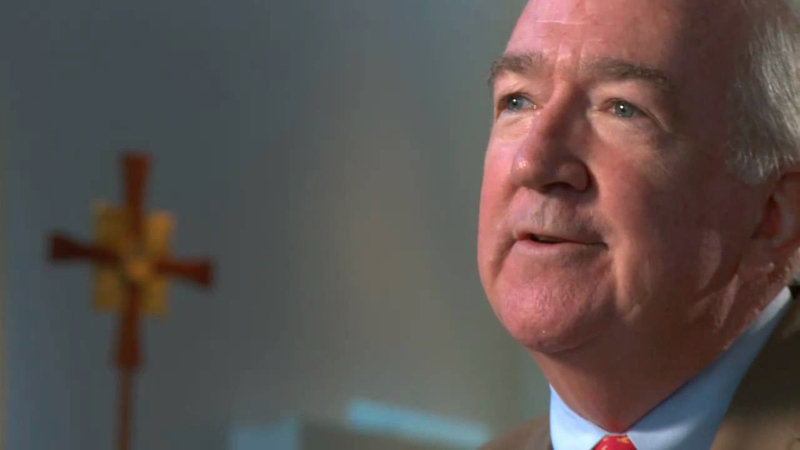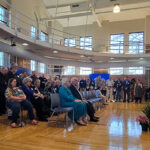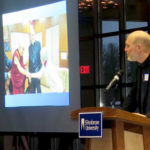By Barb Arland-Fye
The Catholic Messenger
Ken Hackett, the newly retired U.S. ambassador to the Vatican who previously led Catholic Relief Services, will give the commencement address for Davenport-based St. Ambrose University. The ceremony takes place May 13 at 1 p.m. at the iWireless Center in Moline, Ill.

The persistence of Sister Joan Lescinski, CSJ, St. Ambrose University’s president, convinced Hackett to accept the invitation four years after she first made the request. His schedule has eased and he has the ability to speak more freely now that he has left his diplomatic post, he said.
“We were eager to bring Ken Hackett to St. Ambrose University to award him an honorary degree because his life and values harmonize so beautifully with ours as a Catholic university,” Sr. Lescinski said. “We believe he is the kind of role model that our students and graduates can be proud of.”
Decades in service to others helped shape Hackett as a role model. After graduating from Boston College in 1968 he joined the Peace Corps, figuring that his business school experience could be a way to put his management skills to good use. Serving with the Peace Corps in Ghana gave him “great respect for the resiliency and creativeness of people who don’t have the economic benefits of life.”
In 1972, Hackett began his long career with Catholic Relief Services (CRS), the U.S. bishops’ overseas aid agency, taking assignments in Sierra Leone, other parts of Africa and Asia and at CRS headquarters in Baltimore. He assumed duties as CRS’ executive director in 1993 and was appointed president in 2003.
He spoke of the events and crises that affected him deeply. “The genocide in Rwanda (1994), which came on the heels of the wars in Bosnia and Somalia, was a transformative moment … for me and the agency. We had to look deeply into our corporate soul and say, ‘What did we do wrong?’ ‘What didn’t we do?’ We had been in Rwanda for decades before the genocide. We didn’t see the evil that was there,” he reflected.
“The famine in Ethiopia in 1984 was also a very transformative period. It was very difficult when we were actually arguing with our own government about assistance to Ethiopia,” he said. “The Haitian earthquake (2010), for me, was a challenge. We had to make some very difficult decisions because Haiti is plagued by a lot of corruption.” Improper building practices led to the collapse of many structures during the earthquake, he said. CRS was determined to follow the best design and principles and set up a separate corporation to manage reconstruction of church buildings, schools and community centers. CRS faced criticism, even from some bishops, because progress was slower than anticipated. Hackett described dealing with the scourge of HIV in Africa as another tough challenge.
Two years after retiring from CRS, Hackett became U.S. Ambassador to the Holy See in August 2013 — five months into the papacy of Pope Francis. Hackett retired from that post in January. During his tenure, St. Teresa of Kolkata was canonized (September 2016). He had previously attended her beatification in 2003. “CRS has a long and close relationship with her Missionaries of Charity,” he noted.
The Holy Father’s visit to the United States in 2015 was the highlight of Hackett’s diplomatic service. “That was successful; we worked hard. And (the Holy Father) left a positive impression on the majority of people in America.” Perhaps even more importantly, Pope Francis’ visit to the U.S. “made Catholics feel good about themselves.”
The commencement address Hackett is crafting for St. Ambrose University takes inspiration from the Holy Father. “Commencement speakers are not necessarily memorable, but hopefully leave two or three points that you can remember,” Hackett observed.
He’ll focus on encouraging the new grads to not be afraid to take a chance, to do the right thing even if they face criticism at the time, and to speak the truth.
One particularly powerful point he takes from the Holy Father: “Time is more important than space. It comes out of his first encyclical. We live in a time when the space – the power the influence, the position – sometimes captures us. We really want to wait it out a little bit and let things flow. We’re not in charge. God is there and he’s got some things figured out, so don’t think you can control every environment. … You have to be attentive to what time teaches you, what life’s lessons teach you.”











